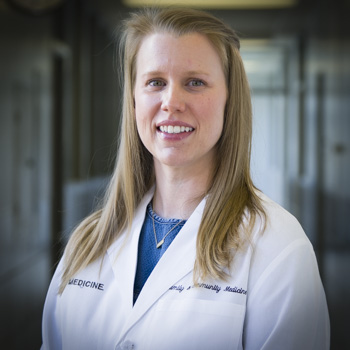May is Mental Health Awareness month and a good time to take a closer look at the primary care services that treat both mind and body.
In particular, our UAB Family and Community Medicine clinics offer behavioral health consultations and treatment. Though behavioral health care encompasses mental health care, there are some important distinctions. Behavioral health care providers typically collaborate closely with a patient’s primary care provider to help address health issues, including mental health concerns, in a medical or clinical setting. Specialty mental health providers may or may not collaborate directly with the patient’s medical team and may be housed either in a hospital or medical setting or in community mental health centers or private practices.
 Kaylee Crockett, Ph.D.
Kaylee Crockett, Ph.D.
We asked Kaylee Crockett, Ph.D., assistant professor, clinical health psychologist and clinical scientist, to expand on the benefits and opportunities of behavioral health care and what patients can expect. Crockett currently offers behavioral health consultations and treatment to patients in our family medicine clinics and works with athletes through UAB Sports and Exercise Medicine. She is also an NIH-funded research faculty member with research focused on addressing the psychosocial factors that contribute to poor health outcomes among populations living with and at risk for HIV.
Here is what she had to say.
Q. What can patients expect from behavioral health care in a primary care setting?
A. Primary care behavioral health (PCBH) is a model of team-based care aimed at preventing and managing behavioral health problems and chronic health conditions. Typically, this means a patient can expect to meet with a “behavioral health consultant” (BHC) that will work with their primary care team to help manage the problem or condition. Often the behavioral health consultant is a licensed psychologist or a masters-level counselor with a license in mental health counseling or clinical social work as well as specialized training in behavioral medicine.
When first meeting a BHC, the patient will typically have an assessment of the problem at hand where they will discuss when the problem started, what makes it worse or better, and what they have tried so far to address it. Then the BHC will clarify what the problem is, provide some education, and develop a treatment plan collaboratively with the patient.
Q. What happens after that initial meeting?
A. Oftentimes the problem can be addressed by the BHC in a few focused sessions where the BHC will assist with skill development to manage the problem more effectively and reduce symptoms. The primary care provider oversees this treatment and collaborates with the plan. As the problem resolves, patients may discontinue seeing the BHC and return if needed. If the problem does not resolve in primary care, specialized referrals may be offered for additional support.
Q. What are the services that we offer patients and what concerns can you and the primary care team help address?
A. Services in primary care behavioral health include brief assessments, education and treatment planning. Follow-up services are offered via brief (30-minute) sessions that are focused on offering support and skill development.
Services may address concerns such as stress management, anxiety, depression, trauma recovery, insomnia, substance use and smoking cessation, eating habits and weight concerns, behavioral modification for ADHD, health-related goal setting, chronic pain, coping with chronic health conditions such as hypertension and diabetes, relationships issues, grief.
Q. Who can benefit from these services?
A. Anyone who is concerned that a cognitive, behavioral, emotional or social issue is impacting their health, daily functioning and wellbeing can benefit from behavioral health consultations in primary care.
If you are interested in a behavioral health consultation, you can make an appointment by calling 205-934-9700.